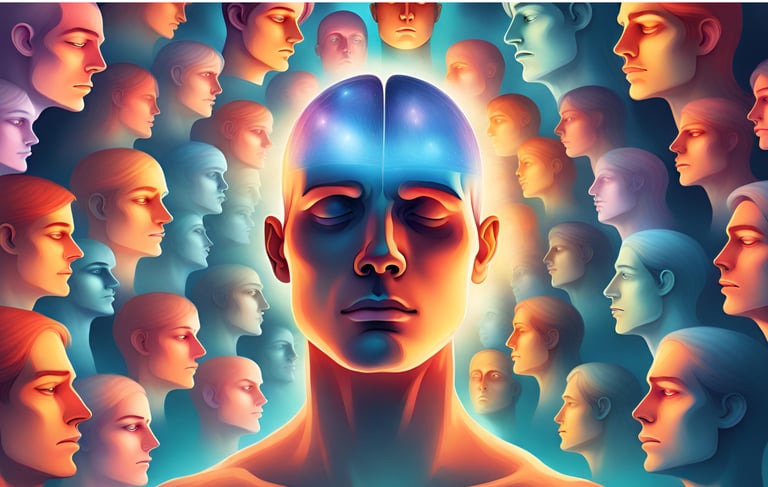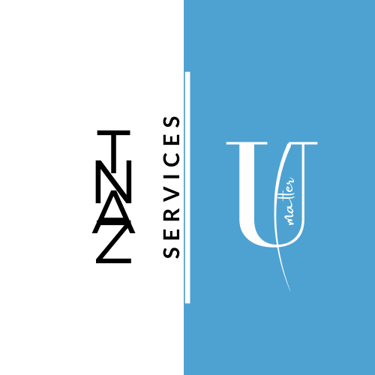Support & Services
Primary Specialty
Clients I work with the most
Life can feel heavy, overwhelming, or uncertain when depression or anxiety shows up. In therapy, we’ll gently explore your experiences, build coping strategies that actually help in your day-to-day life, and create space for hope and clarity.
Living with ADHD or Autism as an adult can mean navigating focus challenges, sensory overwhelm, executive functioning stress, or social expectations that feel confusing. Together, we’ll work on practical tools, self-understanding, and strategies so you can feel more grounded, capable, and confident in your everyday world.


Complex trauma affects how the world feels — inside and out. With compassionate care, we’ll work at your pace to understand your nervous system, build safety and stability, and gently integrate your story so you can feel more present, secure, and rooted in your life.
Complex Trauma
Secondary Specialties
What I can also help with
Relationships


Whether it’s with a partner, family, friends, or at work, relationships shape so much of how we feel. Therapy can help you understand patterns, express needs with confidence, heal from hurt, and build connections that feel safe, respectful, and fulfilling.
Narcissistic Abuse Recovery
Healing from narcissistic or manipulative abuse can feel like unraveling years of confusion, self-doubt, and emotional pain. In therapy, we'll gently explore the effects of manipulation, and build skills that help you reclaim your confidence and identity.
Feeling confident and worthy of love, respect, and joy doesn’t always come naturally — especially when life has worn down your belief in yourself. Together, we'll work on challenging your inner critic, and nurture a grounded sense of self-worth you can carry into your relationships, work, and everyday life.
Self Worth/Confidence

Anxiety/ Depression
Autism (L1)/ADHD
Self-Esteem
Complex Trauma (cPTSD)
Relationships & Interpersonal Issues, etc
Primary Expertise
Neurodivergence Support ( ADHD & Autism (L1))
"Your brain is not broken, you are interpreting the world through a different operating system."
So much of the world is designed for a neurotypical brain, which can leave you feeling exhausted, misunderstood, and constantly trying to "fit in." My approach isn't about fixing you; it's about helping you unmask, understand your unique brain wiring, and build a life that works for you. Together, we'll develop practical strategies for organization, focus, and social energy, while nurturing your innate strengths, passions, and sense of self-worth.
Autism (ASD) Affirmation & Support
Embrace your authentic self. Thrive in a neurotypical world.
So much of the world is designed without the autistic experience in mind, which can lead to a lifetime of feeling misunderstood, forcing yourself to "mask" your true nature, and navigating overwhelming sensory and social demands. My approach is rooted in neurodiversity affirmation. This means our work isn't about teaching you to act "less autistic," but about helping you unmask, understand your brilliant brain, and build a life that honors your needs. Together, we can:
Safely Unmask: Explore your authentic identity and reduce the exhausting effort of camouflaging.
Navigate Social Landscapes: Develop a social toolkit that feels authentic to you, focusing on connection over performance.
Manage Sensory & Emotional Overwhelm: Create strategies for regulating your nervous system in an overstimulating world.
Leverage Your Strengths: Channel your deep focus, passion for special interests, honesty, and unique perspective into a fulfilling life.
ADHD Support and startegy
Work with your brain, not against it
Living with ADHD can feel like being the pilot of a high-performance jet... with a confusing control panel. You have a powerful engine for creativity, hyperfocus, and out-of-the-box thinking, but the challenges with executive functions—like planning, prioritizing, and task initiation—can lead to frustration, shame, and a feeling of never quite meeting your potential. I help you decode your brain's unique operating system.
We'll work together to:
Master Executive Functions: Build personalized, sustainable systems for organization, time management, and motivation that actually work for an ADHD brain.
Harness Hyperfocus & Creativity: Learn to direct your intense focus and innovative thinking toward your goals.
Manage Rejection Sensitive Dysphoria (RSD): Develop tools to cope with the intense emotional pain of perceived criticism or rejection.
Break the Shame Cycle: Replace self-criticism with self-compassion, understanding that your struggles are not a moral failing, but a difference in neurobiology.
Finding Calm: Overcoming Anxiety & Overwhelm
When anxiety takes over, it can feel like you're constantly bracing for impact. You might be managing social fears, panic attacks, or a relentless inner critic. I provide a supportive space to understand the roots of your anxiety, not just manage the symptoms. We will work together to develop a personalized toolkit to calm your nervous system, challenge anxious thoughts, and face life's challenges with greater confidence and resilience.
Healing From Depression & Rediscovering Joy
Reconnect with the light within yourself.
Depression is more than just sadness; it's a heavy blanket that dims your energy, motivation, and hope. It can make the things you once loved feel meaningless. My role is to walk with you through this fog, offering compassionate support to address feelings of hopelessness, irritability, and isolation. We will gently explore what's beneath the surface and chart a path back to a life filled with energy, connection, and meaning.
Trauma Recovery & Restoring Safety
Gently process your past, so you can live fully in the present.
Trauma can leave you feeling stuck, on high alert, or disconnected from your own body and life. Whether you've experienced a single shocking event or prolonged stress (like abuse or neglect), healing is possible. In our work, your sense of safety is the priority. I use a sensitive, non-judgmental approach to help you process painful memories, release their emotional charge, and rebuild your capacity for resilience, trust, and calm.
Narcissistic & Manipulative Abuse Recovery
Reclaim your reality, your peace, and your self.
The aftermath of a relationship with a narcissistic or manipulative person is uniquely devastating. It's more than just a "bad relationship"—it's a systematic erosion of your self-trust, where you've been made to question your own memory, perceptions, and sanity (a experience known as gaslighting). You may be left feeling isolated, anxious, and deeply confused, struggling with a tangled web of grief, anger, and guilt.
Creating Fulfilling Relationships
Build the connection you crave.
Whether you're navigating the dating world or wanting to deepen your long-term partnerships, relationships are a source of both great joy and significant challenge. I help individuals understand their attachment styles and communication patterns, break negative cycles, and express their needs and desires more effectively. Our work is about moving from conflict and frustration to intimacy, security, and mutual satisfaction.
Cultivating Self-Worth and Confidence
Silence your inner critic and become your own strongest ally.
That voice of self-doubt can be a constant companion, holding you back from opportunities, relationships, and speaking your truth. We'll explore where this critical inner voice came from and how it has protected you, while also learning how to quiet it. Our focus will be on empowering you to replace self-criticism with self-compassion, build unshakable confidence from the inside out, and finally see yourself with the kindness and respect you deserve.
Other
Medical professionals' mental health
Race & cultural identity
Spirituality & religion
Shame/Guilt

My Modalities
In the context of therapy, a treatment modality refers to a specific approach or method used by therapists to address mental health concerns. These modalities guide the therapeutic process and help individuals improve their well-being.
Cognitive Behavioral Therapy
Cognitive Behavioral Therapy ( CBT) is a type of psychotherapy that helps people change their thoughts and behaviors that are causing them problems. CBT is based on the idea that our thoughts, feelings, and actions are all connected and that by changing one of them, we can improve the others.
Some common techniques used in CBT include:
Cognitive Restructuring: Identifying and challenging negative or irrational thoughts, and replacing them with more positive and realistic ones.
Behavioral Activation: Encouraging individuals to engage in activities they once enjoyed, even if they don't feel motivated to do so at first.
Exposure Therapy: Gradually exposing individuals to situations or stimuli that they fear or avoid, in a controlled and supportive environment, to help them overcome their anxiety.
Relaxation and Mindfulness Techniques: Teaching individuals relaxation and mindfulness techniques such as deep breathing, progressive muscle relaxation, or meditation, to help reduce stress and anxiety.
Problem-Solving Skills: Helping individuals develop problem-solving skills to address their issues and improve their ability to cope with stress and challenges.
Homework Assignments: Assigning tasks to individuals outside of therapy sessions to help reinforce and practice the techniques learned in therapy.
These techniques are tailored to meet the specific needs of each individual and can be modified throughout the course of therapy as needed.
Focus: Challenging negative thought patterns and behaviors.
Techniques: Identifying and modifying irrational thoughts, behavioral experiments, and skill-building.
Applicability: Effective for anxiety, depression, and other conditions.


Psychodynamic Therapy
Psychodynamic approaches aim to better understand oneself by examining inner conflicts. Therapists explore connections between current feelings and past experiences, identifying patterns in thoughts, experiences, and relationships. This approach can alleviate distress and improve relationships.
Focus: Exploring unconscious conflicts and early experiences.
Techniques: Analyzing dreams, free association, and transference.
Applicability: Useful for understanding underlying dynamics and improving relationships.


Humanistic Therapy
Humanistic therapy is a type of therapy that focuses on the person as a whole, not just their problems or symptoms. It is based on the idea that people have the potential to grow and change and that they need a supportive and accepting environment to do so.
Focus: Humanistic therapy emphasizes a person’s unique potential, innate goodness, and personal growth. It views individuals holistically, considering their entire being rather than just specific aspects of life.
Approach:
Client-Centered Therapy (Person-Centered Therapy): In this approach, the therapist takes a non-directive stance, treating the individual as an equal partner. Empathy and unconditional positive regard are central. The focus is on self-discovery and self-acceptance.
Existential Therapy: A philosophical approach that helps people explore their place in the universe, find meaning, and take responsibility for their choices.
Gestalt Therapy: Concentrates on the present moment, emphasizing how individuals perceive and make meaning out of their experiences.
Logotherapy: Aims to help people endure life’s difficulties by finding purpose and meaning.
Narrative Therapy: Helps individuals identify values and skills by focusing on personal stories, emphasizing separation from problems.
Effectiveness: Research suggests that humanistic therapy can be effective for various disorders, including depression, psychosis, relationship issues, and trauma.


Internal Family Systems
RInternal Family Systems (IFS) therapy, an evidence-based approach, recognizes that we all have different "parts" or sub-personalities within us. Unlike family systems theory, IFS focuses on these internal parts and their interactions, viewing the mind as an internal family led by a core "Self." IFS therapy aims to bring balance, self-compassion, and self-leadership to this internal system, often incorporating elements of spiritual healing.


Other modalities
Solution Focused Therapy
Solution-focused therapy is a practical, future-oriented approach that emphasizes solutions rather than dwelling on problems. It focuses on identifying what's already working in your life, even in small ways, and using those strengths to build a better future. Instead of analyzing the past, you'll work collaboratively with your therapist to set achievable goals and discover concrete steps to reach them. It's a brief, empowering therapy that helps you quickly create positive change.
LIFE COACHING
Life coaching empowers you to achieve your personal and professional goals. Coaches help you clarify your vision, explore options, create action plans, overcome obstacles, and stay motivated. They act as a supportive partner, providing tools for self-discovery and empowering you to find your own solutions, rather than simply telling you what to do.
Dreamwork
Dreamwork therapy uses your dreams as a powerful tool for self-discovery. By exploring the symbolism and connections between your dreams and waking life, you can uncover hidden thoughts and feelings. Working with a dreamwork therapist can help you gain valuable insights into your inner world and develop healthier sleep habits and self-care routines.


